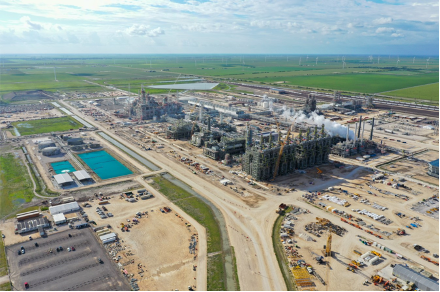Construction
As an EPC contractor, Chiyoda is responsible for executing plans and designs developed during the detailed engineering phase, including managing construction subcontractors, to ensure a reliable project is safely delivered to the customer within quality, schedule and budget parameters. Complex plants involve many engineering disciplines, including civil engineering (eg: underground work in the form of foundations, drainage and other services and above ground construction such as structures and buildings), mechanical/process engineering, piping engineering and electrical/instrumentation/controls engineering etc. Large-scale plants typically employ many thousands of workers per day at their peak and also require the application of such disciplines to temporary construction (ie: accommodation camps and associated services) in addition to the permanent plant facilities.
Chiyoda’s construction division, consisting of high caliber professional engineers, conducts all construction planning ‘in-house’, working collaboratively with other departments such as engineering, procurement, commissioning, health and safety and quality etc, giving complete control over planning activities.
The availability of Chiyoda’s permanent engineering and construction personnel facilitates seamless transition from FEED to EPC to construction enabling, for example, commencement of constructability studies prior to finalization of plot plans, early preparation and integration of engineering, procurement and construction schedules, early procurement and involvement of specialist contractors (eg: heavy lift/heavy haul specialists), in risk and opportunity, constructability and HAZID workshops etc and facilitating more robust cost estimates.
Construction strategy, such as modularization*1, prefabrication, dress-out approach and piperack construction methodology (ie: ‘lasagne’ method), depends on market factors and optimization studies conducted during FEED. Modularization studies are performed to ascertain the requirement for, and the extent of, modularization (as opposed to a ‘stick-built’ strategy) and the optimum balance and mix of module size, weight and type. Partial or full modularization reduces construction site manhours by shifting work offsite and matching work scopes to skill sets in module fabrication yards and de-risks construction schedules by utilizing parallel execution of multiple construction scopes. Chiyoda’s extensive project execution experience includes construction in areas requiring a fully modularized strategy, which typically follows the criteria listed below:
- Inclement weather such as temperature extremes and/or high precipitation that disrupt production on site;
- A shortage of skilled local labor and/or high labor recruitment/retention costs;
- Environmentally sensitive locations with limited on-site storage;
- Inefficient local construction facilities and/or infrastructure; and
- Inefficient local transportation and/or communication
- Modular construction involves constructing sections of a facility in segments (modules) in separate locations for transportation to site.
【Case Study】 Early Completion of the World's Largest Ethylene Plant through Modular Construction

Chiyoda AWP
Advanced Work Packaging (AWP) is a project management methodology developed collaboratively between the Construction Industry Institute (CII) and the Construction Owners Association of Alberta (COAA) to improve productivity and reduce costs in construction using industry best practices. Chiyoda’s AWP improves workforce productivity and benefits large-scale and complex capital projects by aligning engineering and procurement deliverables with the construction sequence.
As a link between the engineering, procurement and construction, Chiyoda AWP is a complete EPC management system to improve efficiency in fabrication and construction execution. Typically, construction work is divided into manageable work packages and, by aligning methodology, procedures and software tools to deliver information, materials, equipment and labor resources prior to commencement of construction, Chiyoda maximizes efficiency through increased productivity.
Chiyoda’s AWP is executed using ‘in-house’ developed system tools designed to supplement EPC functions and benefit projects by increasing profitability, Improving project forecasting and Improved project planning.
Safety is our Core Value
Chiyoda’s strategic project objective is ‘Goal Zero’ – no harm to people and no significant incidents. This is achieved on projects through Chiyoda’s leadership and commitment with a continuous focus on all aspects of health, safety and the environment and implementing management systems as a roadmap to realizing the objective. Chiyoda takes responsibility for a project’s safe construction and initiates programs to ensure all hazards are identified and mitigated with the aim of achieving ‘Goal Zero’.
Conformance to codes and regulations
Chiyoda’s quality objective is to construct a project within local and customer technical, safety and environmental codes, standards and regulations and to levels of reliability and operability that exceed customer expectations. Quality performance is the direct responsibility of each and every individual working on a project and Chiyoda maintains a culture of ownership for quality and workmanship during construction. Chiyoda’s construction teams ensure that subcontractors and vendors similarly communicate the same commitment to quality to all their personnel through a Project Quality Policy, quality plans and objectives, systems and procedures and by actively participating in quality promotion activities.
Respect for Local Culture
Chiyoda’s ‘One Team’ project execution culture extends to ensuring local labor and businesses are procured during construction as much as possible. Chiyoda’s commitment is to ‘Hire Local First’ and develop local industry in the ‘One Team’ approach. Such a strategy develops and mentors local businesses and builds capacity within local industry to ‘add value’ and grow the capability of local businesses and labor by working on projects to support their success and development.
